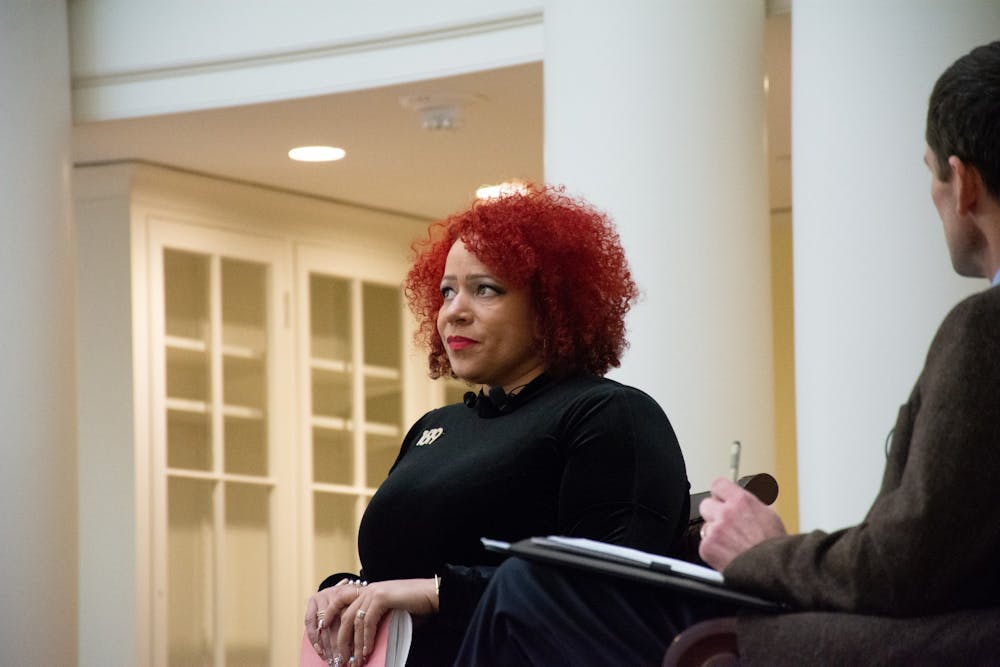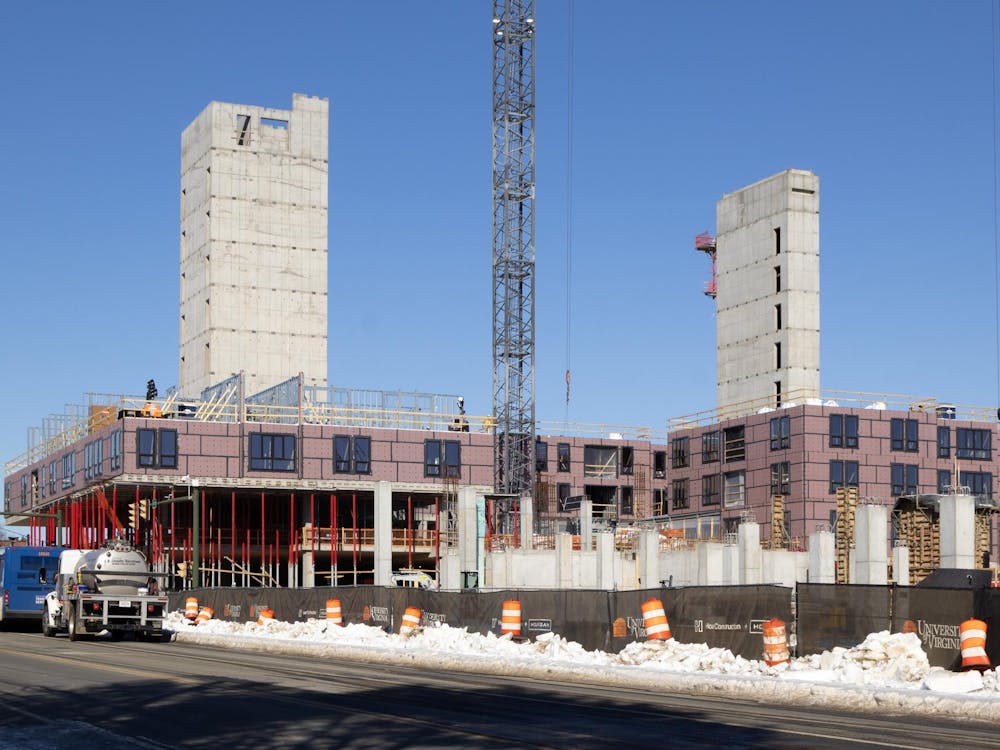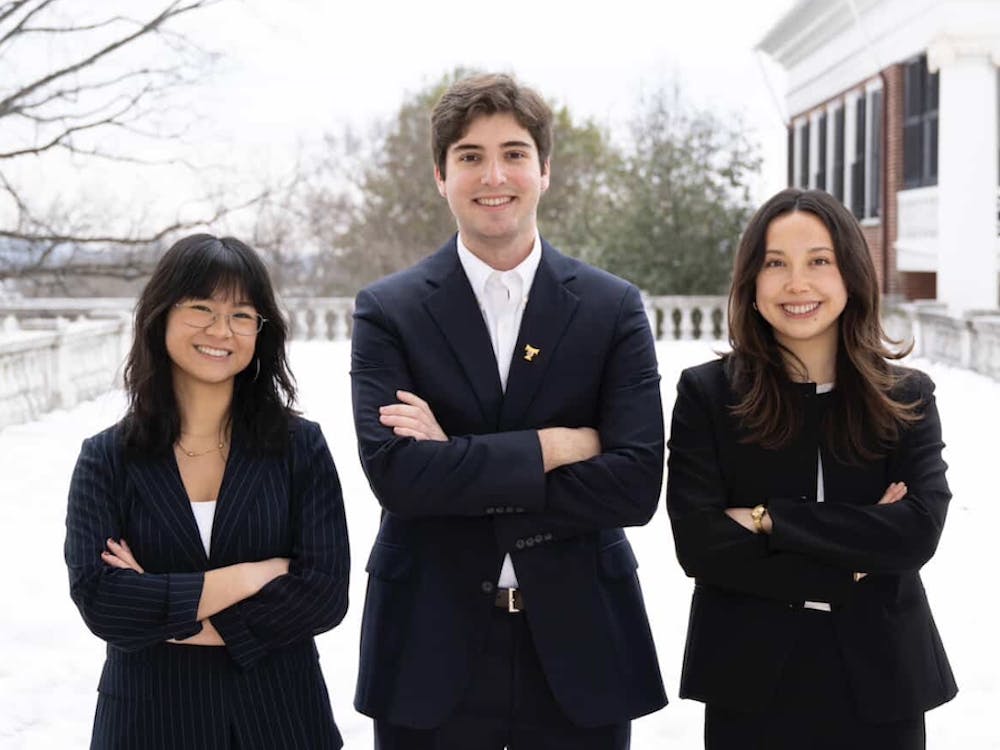The University’s Democracy Initiative sponsored Nikole Hannah-Jones — a New York Times writer and creator of the 1619 Project — Monday at the Rotunda for a discussion with University President Jim Ryan. The event at the Rotunda quickly sold out, prompting event organizers to hold another discussion later that evening at The Haven — a homeless shelter and event space in Downtown Charlottesville — moderated by Jamelle Bouie, a columnist for The New York Times.
The 1619 Project, published in The New York Times Magazine last August, consists of a collection of essays exploring different facets of American life that have roots in slavery — such as sugar, traffic jams and the criminal justice system.
Paper copies of the magazine sold out the first day they hit newsstands.
Hannah-Jones began her discussion in the overflowing Rotunda Dome Room by speaking about her day in Charlottesville — a place she had never visited before — during which she did a walking tour of the Confederate monuments and visited Monticello.
“[The University] is in some ways the perfect place to have this conversation,” Hannah-Jones said. “All the hypocrisies and ideals the project tries to lay bare, so much of that begins right here.”
During her second discussion at The Haven, Hannah-Jones stated that the “entire University campus is a monument to white supremacy,” referring to the Rotunda, which was built by enslaved laborers, yet has come to represent Thomas Jefferson.
Hannah-Jones also frequently mentioned the idea of reparations — that descendants of enslaved workers are owed some monetary compensation. She suggested that the University could provide monetary reparations to descendents of those who were formerly enslaved laborers.
“There should be free tuition at this University for every family member of the enslaved who worked here, period,” Hannah-Jones said.
At the discussion in the Rotunda, Hannah-Jones said that those uneasy about reparations should introspect.
“If you’re really uncomfortable with that notion, you really have to ask yourself why,” Hannah-Jones said.
The Project’s origins
Hannah-Jones traced the origins of the 1619 Project back to her personal studies of Black history in high school, when she read “Before the Mayflower” by Lerone Bennett Jr. It was then that she first saw the date August 1619 — when the first African slaves arrived on American shores.
“I remember feeling a jolt when I saw that date because I never knew that we were in the country that long,” Hannah-Jones said. “Even as a 16-year-old, I knew that there was a power in that erasure, and that erasure was very intentional.”
That date stuck with her for 25 years, and as 2019 — the date’s 400th anniversary — approached, Hannah-Jones pitched the 1619 Project to her editors at The New York Times. The collection of essays from different authors analyze different taken-for-granted parts of American life, tying them back to the effects of slavery — all with the goal of displaying “what slavery wrought.”
After a brainstorming session with a group of historians, sociologists and other scholars, Hannah-Jones decided on 11 topics — democracy, capitalism, bias in the medical profession, healthcare, reactionary politics, traffic jams, the racial wealth gap, black music, prisons, the law profession and a collection of poems and stories about African American history.
Hannah-Jones, who wrote the project’s first essay on democracy in America, said her essay details the contradiction between the claims of equality among men in the Declaration of Independence and the existence of slavery.
“I wanted that essay to call that hypocrisy out right from the beginning and to say that, though we like to think that the true heart of America is the Boston Tea Party, the abolitionist North, people were bought and sold in Boston too,” Hannah-Jones said. “Our founders are very heavily Southern, so you cannot erase the South from the true heart of America.”
In response to criticism
Ryan then turned the conversation to criticisms launched at the 1619 Project, namely that the Revolutionary War in large part occurred to preserve the institution of slavery.
“I didn’t just sit down one day and say ‘I’m going to make up some sh–t about the revolution,’” Hannah-Jones said to laughter from the crowd. “When I write that preserving slavery was a major cause in the Revolutionary War, it’s because I got that from historians who have historiography showing that.”
Hannah-Jones said she thinks the criticism stems from her lack of credentials as a historian and people’s reluctance to accept a counternarrative about the effects of slavery in America.
During the discussion at The Haven, moderator and New York Times columnist Jamelle Bouie asked Hannah-Jones about how she reacted to the responses to the project.
In response, Hannah-Jones said that reactions critical to the project were not that surprising.
“You don't create a project with The New York Times that argues that 1619 was actually the founding, not 1776, that slavery is actually foundational to America, that black people are actually our Founding Fathers, and not expect that's gonna upset a lot of people,” Hannah-Jones said.
Making progress?
Toward the end of the Rotunda discussion, Ryan asked Hannah-Jones whether there was hope for progress — a question she quickly shot down.
“I get asked about hope every time I give a talk,” Hannah-Jones said. “The motivation is, if I’m hopeful, then the people who benefit from the system don’t really have to do the work to destruct the system that keeps us on the bottom.”
As a 43-year-old black woman, Hannah-Jones pointed out that she is part of the first generation of black Americans to grow up with full citizenship, and the history of African-American disenfranchisement is recent history. She added that, for her, hope isn’t a useful emotion.
For universities to address the lasting effects of slavery, she called for monetary reparations to descendants of enslaved laborers and free tuition for the descendants of the enslaved laborers who built the University.
“All this studying is well and good, but slavery was designed to extract wealth and profit from human beings, so if there’s no … monetary repair, then I don’t think any of these universities [with a legacy of slavery] are serious about what they intend to do about the legacy of slavery,” Hannah-Jones said.
Questions from the audience followed along this topic, as Myra Anderson, a descendant of enslaved laborers at the University, asked Hannah-Jones how to further advocate for the University to honor the legacy of those who built the institution — beyond the Memorial to Enslaved Laborers.
“As a descendant, I’ve found that it’s sometimes hard, lately, to try to get voice at the University and understand what we can do to further their commitment in honoring the legacy of the work that our ancestors did at places like this,” Anderson said.
Hannah-Jones urged Anderson to keep speaking out and showing up to events of similar nature. In response, Ryan added that the University is working to study and contact the descendants of enslaved laborers through the President’s Commission on the University in the Age of Segregation. Ryan did not specify what will be done with the results of the commission’s work.
Community activist Tanesha Hudson and first-year College student Zyahna Bryant also brought up the issue of space and place at the University, particularly in light of recent controversy surrounding use of the new Multicultural Student Center.
After Bryant, who doubles as a Charlottesville community organizer, inquired about how the University benefits from the exploitation of marginalized students, Hannah-Jones gave Bryant the floor to say, in her opinion, what the University has to do. Bryant called for the University to fund the Office of African American Affairs, pay a wage above $15 to workers and support black faculty.
“We need to have a real conversation about race,” Bryant said. “The fact that we’ve given this half-baked statement saying that the University needs to have spaces for all of its students, we know that that’s not true.”







